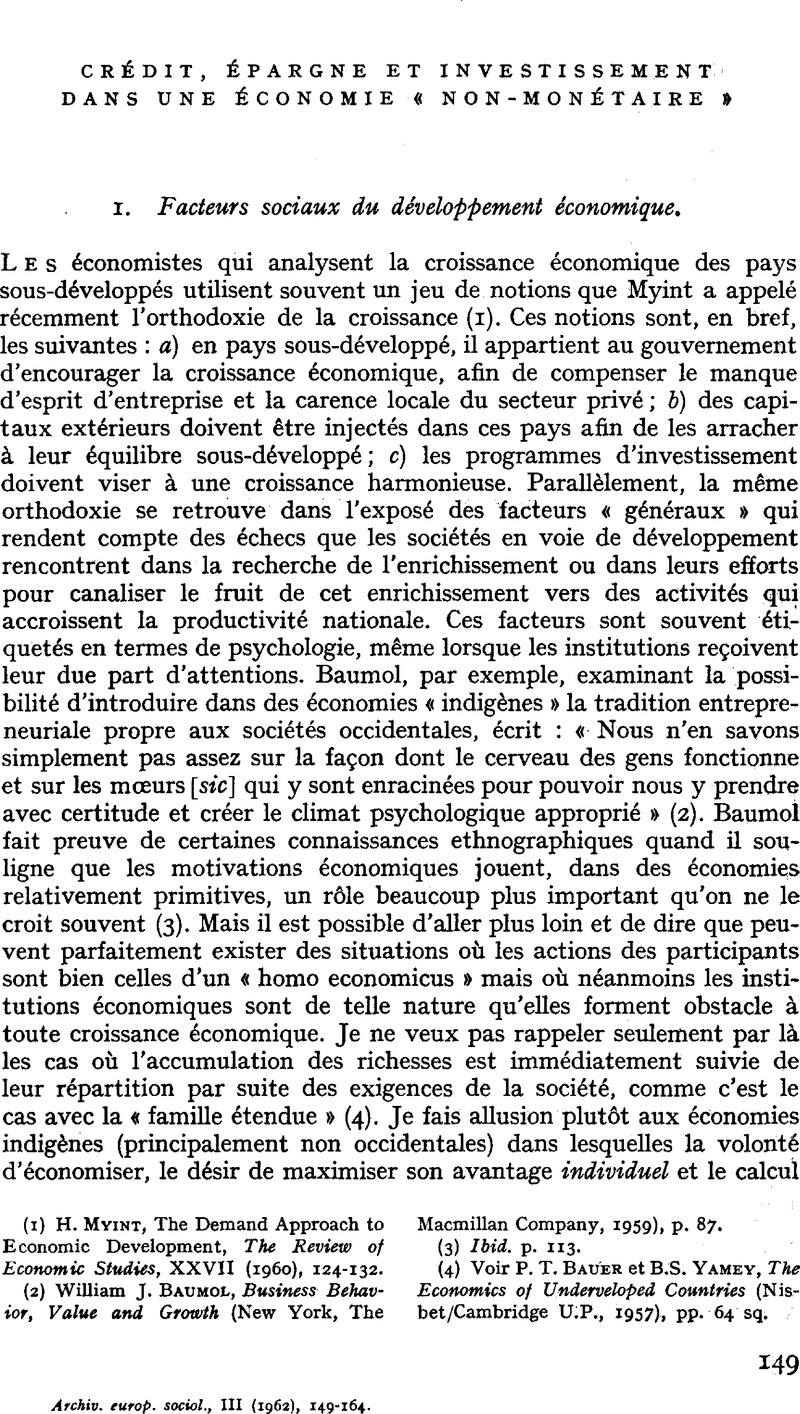No CrossRef data available.
Article contents
Crédit, épargne et investissement dans une économie « non-monétaire »
Published online by Cambridge University Press: 28 July 2009
Abstract

- Type
- Notes Critiques
- Information
- European Journal of Sociology / Archives Européennes de Sociologie , Volume 3 , Issue 1 , June 1962 , pp. 149 - 164
- Copyright
- Copyright © Archives Européenes de Sociology 1962
References
(1) Myint, H., The Demand Approach to Economic Development, The Review of Economic Studies, XXVII (1960), 124–132.CrossRefGoogle Scholar
(2) Baumol, William J., Business Behavior, Value and Growth (New York, The Macmillan Company, 1959), p. 87.Google Scholar
(3) Ibid. p. 113.
(4) Bauer, Voir P. T. et Yamey, B. S., The Economics of Undeveloped Countries (Nisbet/Cambridge U.P., 1957), pp. 64 sq.Google Scholar
(5) Lewis, W. A., The Theory of Economic Growth (London, Allen and Unwin, 1955), p. 57.Google Scholar
(6) Armstrong, W. E., Rossel Island (Cambridge, 1928).Google Scholar
(7) Références supplémentaires: Armstrong, W. E., Rossel Island Money: a Unique Monetary System, Economic Journal, XXXIV (1924), 423–429CrossRefGoogle Scholar; Armstrong, W. E., Shell Money from Rossel Island, Papua, Man (1924), 161–162Google Scholar; Armstrong, W. E., Anthropology of the South-Eastern Division, Annual Report Papua (1921–1922).Google Scholar
(8) Cf. Mauss, Marcel: «M. Armstrong, a propos des monnaies de l'île Rossel, […] donne des indications fort nettes et persiste, s'il y a erreur, dans la même erreur que nous.» Sociologie et anthropologie (Paris, P.U.F., 1950), p. 179.Google Scholar
(9) In Trade and Market in the Early Empires, edited by Polanyi, Karl, Arensberg, Conrad M., and Pearson, Harry W. (Glencoe, the Free Press, 1957).Google Scholar
(10) On peut cependant recueillir quelques renseignements utiles dans les publications officielles du gouvernement australien sur Papua.
(11) Rossel Island, p. 4.Google Scholar
(12) Ibid. p. 11.
(13) Ibid. p. 18.
(14) Ibid. p. 217.
(15) Qu'Armstrong appelle parfois également dap et kö.
(16) Ibid p. 70.
(17) Ibid. p. 69.
(18) Ibid. p. 61.
(19) L'interprétation de Pierre Métais est légèrement différente, cf. «Une monnaie archaïque: la cordelette de coquillages », L'année sociologique (1949–1950), p. 45.Google Scholar
(20) Rossel Island, p. 63.Google Scholar
(21) Ibid. p. 80.
(22) Arstromg, Voir W. E., Rossel Island Money: [a Unique Monetary System, Economic Journal, XXXIV (1924), 423–429.CrossRefGoogle Scholar
(23) Rossel Island, p. 65.Google Scholar
(24) Ibid. p. 74.
(25) Layard, Voir John, Stone Men of Malekula (London, Chatto & Windus, 1942)Google Scholar; Guiart, Jean, L'organisation sociale et politique du Nord-Malekula», Journal de la société des Océanistes, VIII (1952), pp. 149–259.CrossRefGoogle Scholar
(26) Armstrong, , op. cit. p. 66.Google Scholar
(27) Ibid. p. 186, note 1.
(28) Mauss, Marcel, «Essai sur le don», Sociologie et anthropologie (Paris, P.U.F, 1950).Google Scholar
(29) Ibid. pp. 199 sq.
(30) Voir par exemple Wilmington, M. W., Aspects of moneylending in Northern Sudan, the Middle East Journal, IX (1955), 139–146.Google Scholar
(31) Arensberg, C., The Irish Countryman (New York, Macmillan, 1937).Google Scholar
(32) Polanyi, Karl, Marketless Trading in Hammurabi's Time, in Polanyi, , Arensberg, and Pearson, , eds. Trade and Market in the Early Empires (Glencoe, the Free Press, 1957), p. 13.Google Scholar
(33) Belshaw, Voir Cyril S., In Search of WealthGoogle Scholar, A.A.A., LVII, No. I, Part 2, Memoir No. 80, passim. — II faut ajouter que cette notion d'économie dualiste a été critiquée de nombreux côtés: ce dualisme ne serait qu'une apparence.


